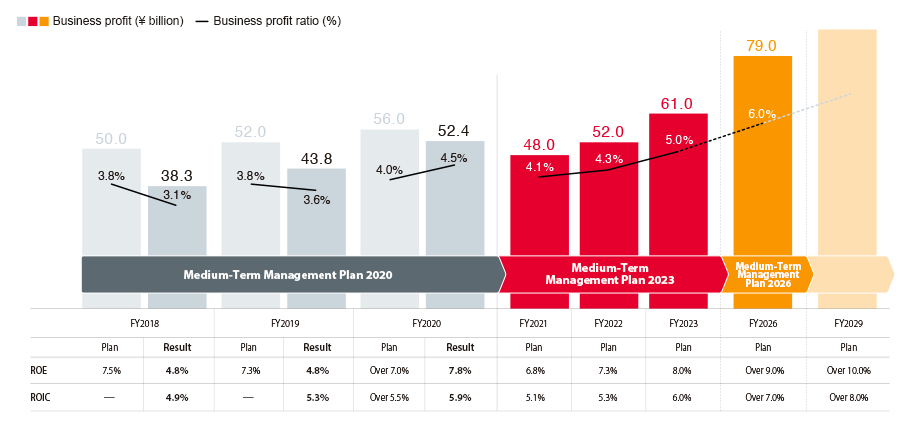The Beginning
The NH Foods Group made a new beginning in 2021 toward realizing sustainability for society and the Group.
The NH Foods Group has grown as a corporate entity and expanded its business domain into new fields and has grown as a corporate entity by providing value that meets changing consumer preferences and fulfilling its corporate mission to provide Joy of Eating.
In the Group’s rapidly changing business environment, we have announced our Vision2030 corporate ideal of “Unleash new potentials for protein” as a milestone toward fulfilling our corporate philosophy. Toward realizing the vision, we have also identified Five Materialities that will be part of the Medium-Term Management Plans 2023 and 2026.

Yoshihide HataPresident and Representative Director
Our objective as the largest supplier of protein in Japan is to ensure a stable supply and a variety of food choices for protein.
The growing global population is expected to increase demand for protein by roughly 2.4% annually over the next 25 years. The production of grain for livestock feed, which is a major source of protein in human diets, is projected to increase at an annual rate between 0.9-1.5%, indicating that protein supply will not be able to keep up with demand. At the same time, the livestock industry must also address greenhouse gas emissions from livestock, which means that the sustainability of the livestock farming is directly connected to the stability of protein supply.
The NH Foods Group supplies protein through products ranging from ham, sausages, and fresh meats to processed foods, seafoods, and dairy products. Protein is a nutrient that is essential for life. The corporate mission of Joy of Eating expresses the pleasures of deliciousness and joys of health that food provides, and I believe it is a source of happiness in people’s lives. We estimate that the NH Foods Group supplies an average of about 6% of the total protein, including 11% of the animal protein, as well as 24% of the meat consumed by the Japanese population.
As the largest supplier of protein in Japan, the Group wants to continue fulfilling our mission and use free thinking to go beyond conventional boundaries and expand the possibilities of proteins.
The Group took a step in that direction in March 2020 when it released the NatuMeat Soy Meat Series to meet growing consumer demand in recent years for plant-based “alternative meat” sources of protein. We are also looking to continue providing a variety of product choices for protein intake. For people with food allergies, we will continue expanding our menu of non-allergenic product offerings that we introduced in 1996. We will also add to our lineup of foods designed for people with reduced chewing ability to further expand the experience of the Joy of Eating
When we were creating the vision, management spent an extensive amount of time discussing all aspects. I even sent out my own questionnaire to employees to learn their thoughts. Their responses conveyed their commitment to the NH Foods Group’s purpose in society and their pride in the Company. Our Vision2030 of "Unleash new potentials for protein” represents the shared objective of all of us in the NH Foods Group.
We executed our strategies and achieved our targets for business profit margin, ROE, and ROIC following our theme of “Building systems that pave the way to the future.”
In fiscal 2020, ended March 2021, which included the impact of the COVID-19 pandemic, consolidated net sales declined 4.4% year on year to ¥1,176,101 million, business profit rose 19.8% to ¥52,426 million, profit before tax increased 80.8% to ¥48,874 million, and profit attributable to owners of the parent increased 69.8% to ¥32,616 million.
The Processed Foods Business recorded a decline in sales of commercial products, but posted higher profits on strong sales of consumer products, including its mainstay SCHAU ESSEN brand products. The Fresh Meats Business posted sluggish sales of imported fresh meats, but higher sales of domestically produced chicken and pork, measures to maintain supply volumes, and improved productivity generated profit growth for the year. The Overseas Business recorded sluggish sales in the Asia/Europe and Australia operations, but firm sales in the Americas operations with sales volume growth for both pork exports and processed foods.
We completed the Medium-Term Management Plan 2020 on a high note in fiscal 2020 in numerical terms. After falling short of the financial targets in the plan’s first two years, we gained momentum and achieved our targets for business profit ratio, ROE, and ROIC in the plan’s final year.
We steadily advanced the management strategies and measures of the Medium-Term Management Plan 2020, which focused on the theme of “Building systems that pave the way to the future.” I was particularly pleased with the progress we made with our specific objective of strengthening profitability by improving the efficiency of existing businesses. The Processed Foods Business achieved its three-year cumulative target for business profit of ¥33.5 billion and the Fresh Meats Business raised its single-year business profit back above ¥40.0 billion. The Overseas Business also showed improved performances for the processed foods businesses in Australia and the Americas (see page 26 for details). We also launched R&D of cultured meat to ensure we continue to fulfill our responsibility to supply animal protein in the future.
One major accomplishment during the year was the Research & Development Center obtaining a patent for the results of its joint research with universities and medical research institutes. The research successfully extracted imidazole dipeptide from chicken tissue and verified that the substance helps maintain and improve memory in the elderly. In the year 2025, it is estimated that one in five people over the age of 65 will have dementia. We plan to develop and introduce functional foods containing imidazole dipeptide to help improve memory in middle-aged and elderly people.
Our pursuit of sustainability included declaring our endorsement in June 2020 of the recommendations of the Task Force on Climate-related Financial Disclosures (TCFD) and becoming a member of the TCFD Consortium. We also joined the Roundtable on Sustainable Palm Oil (RSPO).
At the same time, we recognized that the Group needs to step up its’s ESG sustainability initiatives whici have been too slow to respond to the external environment, so we are once again prioritizing ESG as a point of materiality in the current fiscal year. In accordance with the Vision2030, the new materialities connect addressing social issues to the growth and development of the Group’s business. (See table below)
Five Materialities
-

Stable procurement and supply of proteins
-

Food diversity and health
-

Contributing to a sustainable environment
-

Co-creation and shared prosperity with local communities and society as a whole through food and sports
-

Employee development and respect for diversity
Medium-Term Management Plan results and future targets

We are integrating business strategy and materiality to solve social issues and maximize corporate value.
The Medium-Term Management Plans for 2023 and 2026 will deliver the Group to our Vision2030. The primary objective of the plans is to maximize our corporate value by integrating our business strategies and materiality, solving social issues, and advancing the Group’s growth and development.
We continue to see ample room for growth in Japan, but additional growth will require reforming and strengthening our existing businesses and increasing our presence overseas and in new markets. I plan to maximize our strengths in these areas.
We will shift to a sustainable business model that will decrease risk and increase opportunity while also enabling us to address issues ranging from climate change to labor shortages. We intend to work diligently to produce results during the six years of the medium-term management plans. During the first three years, we will be laying the foundation for ramping up to the nextstage in the second three years.
The financial targets for Medium-Term Management Plan 2023, which concludes with fiscal 2023 ending in March 2024, are for net sales of ¥1,220 billion and business profit of ¥61 billion with a business profit ratio of 5.0%, ROE of 8.0%, and ROIC of 6.0%. The targets for Medium-Term Management Plan 2026, which concludes with fiscal 2026 ending in March 2027, are for net sales of ¥1,320 billion and business profit of ¥79 billion with a business profit ratio of 6.0%, ROE above 9.0%, and ROIC above 7.0%. In fiscal 2029, we aim to have raised ROIC above 8.0% and ROE above 10.0%
Under Medium-Term Management Plan 2023, we will establish an optimal portfolio while continuing our business growth and development.
The management objectives in the Medium-Term Management Plan 2023 are to execute three business strategies and one functional strategy. In addition to the plan’s strategies, management will also be implementing various cross-departmental promotion strategies to maximize group strength.
Under the plan's strategy to “shift to a profitable and sustainable business model,” the Processed Foods Business will strengthen its current business areas and expand into new fields while also improving the productivity of its manufacturing plants. Additionally, the Fresh Meats Business will fortify its procurement and sales capabilities to elevate its profit base. We will also implement Company-wide initiatives to raise ROIC by increasing the sales turnover rate in relation to invested capital, which will enable us to construct the optimal production structure and business portfolio for growth and development. Each business will use ROIC trees and management based on KPI to ensure the measures are effective.
By maximizing cash flow, raising our social value by acting on our materialities, and lowering business risk to minimize WACC, we aim to widen the ROIC spread and thereby raise our corporate value.
The plan’s strategy to construct a growth model for Overseas Business consists of stabilizing the profits of existing businesses to fortify the business base, expanding the Processed Foods Business in the United States and ASEAN, and applying growth strategies focused on areas with business potential.
The third strategy to offer new value through new products and services will seek to reach new customer bases by creating new entertainment, ethical, and wellness businesses and developing direct-to-consumer (D2C) operations. The baseball operation, which has been operated primarily as a promotional activity, will be formed into the Baseball Club Business, which will be operated as a profit-generating operation.
The plan’s functional strategy is to strengthen our corporate functions to enable us to realize the Vision2030. We will fortify our R&D and human resource management by integrating DX to improve the efficiency of existing operations, raise productivity, and build a new business model.
Digitalization will enhance the efficiency and productivity of existing operations, which will reduce operating costs and enhance our data-based decision-making.
The new business model we are formulating will use our digital technologies to provide services for customers and business partners. The new model will also facilitate R&D leading to new businesses, such as research into alternative proteins and the commercialization of smart pig farming. We are budgeting ¥15.7 billion for DX investment over the next three years. While this is an upfront investment, we expect the ¥7 billion investment in fiscal 2026 to generate a return of ¥8 billion. In Medium-Term Management Plan 2023, we have set a total capital investment budget of ¥248 billion, which will primarily be used to fortify our business foundation and for the shift to a sustainable business model. Medium-Term Management Plan 2026 has a capital investment budget of ¥148 billion, which we project will be accompanied by a substantial increase in free cash flow from ¥25 billion in the first year to ¥161 billion in fiscal 2026.
The cross-departmental promotion strategies include a cross-business strategy related to the management policies of shifting to a sustainable business model and growing overseas business that will make maximum use of each business division’s management assets to fortify the Group’s comprehensive strength.
The Hokkaido Project is a development project designed to increase corporate value centered on the Hokkaido Nippon-Ham Fighters baseball team and Hokkaido Ballpark F Village. The corporate communication strategy aims to improve our relations with investors, shareholders, the public, and employees, and is part of the management strategy to strengthen corporate functions.
These strategies will require a rock-solid management base, which we will provide by maintaining our “quality-first management.” Key to this is continuing to receive the objective and specialized opinions of our outside directors based on their various backgrounds. Our efforts in this area are leading to more open exchange of opinions and viewpoints, which are enabling much more meaningful discussions.
I take the criticism very seriously and am seeking to establish sustainable livestock farming methods.
We are very conscious of the environmental issues and animal welfare issues associated with the livestock industry, and I take them very seriously.
The NH Foods Group’s main businesses are raising and processing pigs and chicken in Japan and cattle in Australia.
The livestock industry has been estimated to be responsible for 14.5% of greenhouse gas emissions (GHG), with cattle accounting for most of the emissions. We are accordingly implementing measures to reduce emissions from our cattle livestock. We are also taking steps to reduce water consumption in Australia, which has higher water risk than Japan. In addition, we are seeking to reduce the environmental impact of livestock operations by enhancing livestock productivity, particularly by improving the feed conversion ratio, or the efficiency which livestock convert animal feed into growth.
These are critical environmental issues for the Group. To reduce the associated risks, we have set new, stricter medium- and long-term environmental targets in areas including reduction of GHG emissions and assessment and response to water risk.
In addition to environmental issues, the smart pig farming we are developing also addresses the social issues of the shortage of successors in the livestock industry and the transfer of technology.
Smart farming is already being tested at two pig farms Shiretoko and South Hokkaido, where the growth status of the pigs is monitored 24 hours a day, and AI image analysis is used to monitor health status and signs of estrus
Steadily implementing our strategies will enable us to better fulfill
our mission as a food company.
With Vision2030 and Medium-Term Management Plan 2023, the Group is embarking on a new start with fully integrated business and sustainability strategies that will lead to business growth and the solutions to social issues.
We will continue working to our strength of providing a stable supply of protein and safe and secure foods backed by our quality-first management so consumers can have abundant choices of flavorful foods to experience the Joy of Eating. I believe these efforts will make the NH Foods Group loved, respected, and preferred, which will lead to rising corporate value.
The COVID-19 pandemic caused dramatic changes in society in 2020.
As a food company, the Group has a social mission to provide a stable supply of safe and secure products and services, and we recognize that we have the ability to maintain an uninterrupted supply chain that allows us to fulfill our responsibility. We have still not reached the end of the pandemic, and we will continue to fulfill our responsibility to ensure the health and safety of Group employees.
I look forward to the unwavering support of our shareholders and investors as we forge the future of the NH Foods Group.
Yoshihide HataPresident and Representative Director

